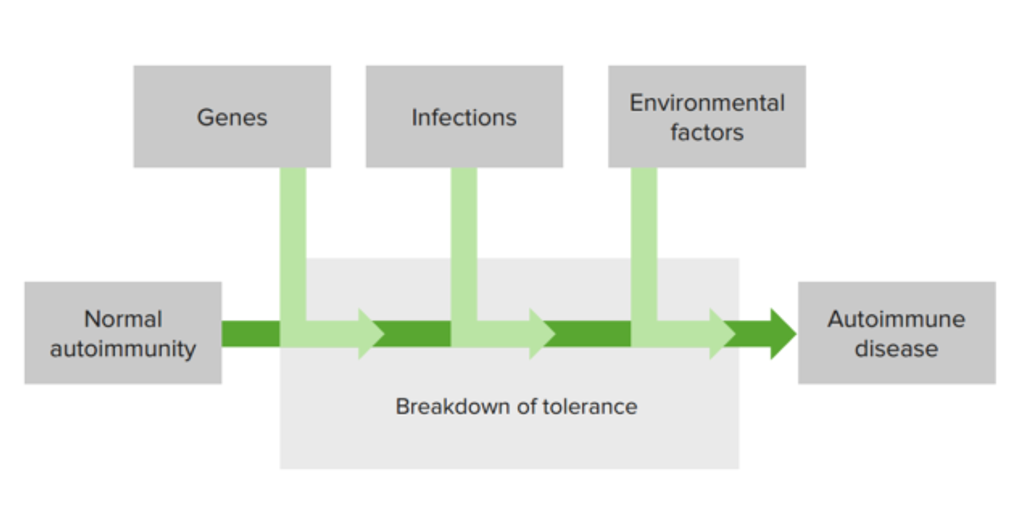Playlist
Show Playlist
Hide Playlist
Summary of How Immune Responses Can Be Harmful
-
Slides Autoimmunity.pdf
-
Reference List Pathology.pdf
-
Download Lecture Overview
00:01 So, final kind of summary. 00:05 T cell, yeah, immune responses in general are protective. 00:09 They're good for us, they protect us from microorganisms, they protect us from tumours. 00:15 However, immune response can be harmful in a number of ways. 00:21 One, you are eliciting, particularly in a DTH type response, delayed type hypersensitivity, a lot of antigen nonspecific mediators and you're activating a whole bunch of macrophages, which don't have any particular antigen specificity. 00:36 So there's a lot of potential damage from those guys that don't have antigen specificity. 00:43 You can have a lot of innocent bystander damage. 00:45 So reactive oxygen species, proteases being elaborated will cause more damage than just the original insult or infection. 00:56 Foreign bodies, as we just talked about, will elicit initially an innate response that can be deleterious because it causes local inflammation, because it causes local scarring and will ultimately in many cases also in gender a an effector T cell response. 01:18 IgE mediated responses in general are going to be allergies, anaphylaxis, asthma, which will be deleterious to the host. 01:29 Again, were intended to be helpful in dealing with worm infections. 01:34 Cross reactive anitgens. 01:35 So we talked about, for example, in rheumatic heart disease, where that streptococcal bacteria elicits an antibody that happens to react with hosts. 01:46 So again, the immune system is just doing its job, it's doing what it's supposed to do. 01:50 But sometimes you make antibodies, or T cell recognition that crosses over just a little bit in response to self. 02:00 You can have intracellular infections. 02:01 And again, the only way that we can deal effectively with intracellular infections is to destroy the infected cell. 02:08 So remember the case of hepatitis B where the viruses in there and once we recognise that cell is infected, we kill it, because that's the only way to clear the viral infection. 02:19 Autoimmunity, special circumstance where you have loss of tolerance to self antigens, will clearly bring into play all of these various components, T cells, B cells, macrophages, neutrophils. 02:34 And then finally allograft rejection. 02:36 So we haven't really talked about allograft rejection. 02:39 If you want to, contact me, we'll talk about allograft rejection because that's what I do my research on. 02:45 But when we put in a foreign graft, a new heart, a new liver, a new kidney, new lungs, what we're also doing is putting in foreign MHC, major histocompatibility complex. 02:56 And now, the recipient, the person who's getting the donor organ, sees this brand new heart, liver, lung, whatever, as one big microbe, and brings to bear all of the immune system to try to get rid of it. 03:13 And that's all our graft rejection is. 03:15 Again, predictable consequences of activating the immune system. 03:20 So with that, we have gone through a fairly significant amount of immunology. 03:25 Hopefully, we've made it really attractive to you but also kind of illustrated how this causes disease. 03:33 And hopefully you will take this way with you and enjoy thinking about mechanisms.
About the Lecture
The lecture Summary of How Immune Responses Can Be Harmful by Richard Mitchell, MD, PhD is from the course Immune-mediated Diseases.
Included Quiz Questions
An example of a harmful immune response is...
- ...autoimmunity.
- ...the T cell–mediated immune response.
- ...the B cell–mediated immune response.
- ...innate immunity.
- ...adaptive immunity.
An example of a harmful immune response is...
- ...an allograft rejection.
- ...adaptive immunity.
- ...innate immunity.
- ...the B cell–mediated immune response.
- ...the T cell–mediated immune response.
Customer reviews
5,0 of 5 stars
| 5 Stars |
|
5 |
| 4 Stars |
|
0 |
| 3 Stars |
|
0 |
| 2 Stars |
|
0 |
| 1 Star |
|
0 |




